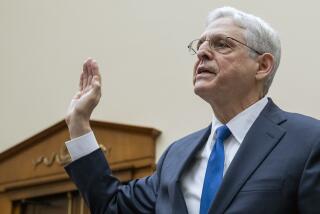Attorney General Barr refuses to testify to House panel after contentious Senate hearing

Democrats grill Atty. Gen. William Barr in hearing over a letter from special counsel Robert S. Mueller III. Â
Reporting from Washington â Atty. Gen. William Barr pulled out of a scheduled House appearance hours after Democrats attacked his credibility during a contentious Senate hearing Wednesday and accused him of deliberately mischaracterizing special counsel Robert S. Mueller IIIâs final report to protect President Trump.
The Justice Department said Barr would not show up for a House Judiciary Committee hearing on Thursday because the Democratic-led panel had overruled Barrâs objections and would allow staff lawyers to question him. A department spokeswoman called those conditions âunprecedented and unnecessary.â
Barrâs boycott marked a new escalation in the raging political battle between the White House and House Democrats, who have stepped up their investigations of Trump since release of Muellerâs report two weeks ago.
The administration has refused to comply with a House Ways and Means Committee request for Trumpâs tax returns and refused to give the House Judiciary Committee an unredacted copy of Muellerâs final report.
The president also has sued the chairman of the House Oversight and Reform Committee to block a subpoena for information about his businesses and sued a bank and accounting firm to stop them from complying with subpoenas seeking his financial records.
Rep. Jerrold Nadler (D-N.Y.), chairman of the House Judiciary Committee, said Barr was âtrying to blackmail the committeeâ to change its rules, and members would consider issuing a subpoena to get him to testify. âCongress cannot permit the executive branch, the administration, to dictate to Congress how we operate,â he said.
During his Senate testimony Wednesday, Barr repeatedly pushed back at his critics, calling the controversy over how he characterized Muellerâs work âmind-bendingly bizarreâ because a lightly redacted version of the full 448-page report was subsequently made public.
He said he was âabsolutelyâ confident in his judgment that the president did not try to unlawfully impede the investigation, and he was âfrankly surprisedâ that Mueller did not reach a conclusion on whether Trump obstructed justice.
âI think that if he felt that he shouldnât go down the path of making a traditional prosecutorial decision, then he shouldnât have investigated,â he said.
He also dismissed a letter of complaint from Mueller as a âbit snitty,â a hint of the growing friction between the attorney general appointed by Trump and the former FBI director who investigated the president.
Mueller wrote Barr on March 27, three days after the attorney general had provided Congress with what he described as a summary of Muellerâs conclusions. In his written response, the special counsel said Barr failed to âfully capture the context, nature and substanceâ of the investigation and contributed to âpublic confusion about critical aspects of the results.â
Despite that complaint, Barr contended that Mueller was not concerned with the accuracy of his summary but with how it was being reported by the media. And he argued that release of Muellerâs report rendered those objections moot.
âI wasnât hiding the ball,â Barr said.
A veteran lawyer, Barr appeared calm and occasionally folksy during the five-hour hearing, at one point saying that after Mueller handed in the report, âit was my baby.â But he parsed his answers carefully and gave little ground to his critics, including some Democrats who called for him to resign.
Democrats made clear they were not satisfied. Sen. Sheldon Whitehouse (D-R.I.) accused the attorney general of âmasterful hair-splitting.â Sen. Richard Blumenthal (D-Conn.) said, âHistory will judge you harshly.â Sen. Mazie Hirono (D-Hawaii) said Barr âlied to Congress.â
The hearing was the latest skirmish in the partisan warfare that has characterized the Russia investigation since it began in mid-2016. Democrats called for Barr to resign or at least recuse himself from investigations emerging from the Russia inquiry, while Republicans pounded the FBI and Justice Department for their conduct at the start of the probe.
âThis attorney general lacks all credibility and has, I think, compromised the American publicâs ability to believe that he is a purveyor of justice,â Sen. Kamala Harris (D-Calif.), who is running for president, said after the hearing.
Sen. Dianne Feinstein (D-Calif.), the ranking Democrat on the committee, pressed Barr about his conclusion that Trump did not obstruct justice during the investigation.
âContrary to the declarations of the total and complete exoneration, the special counselâs report contained substantial evidence of misconduct,â she said.
Trump praised Barr in an interview with the Fox Business Network, saying that Democrats were âranting and raving like lunatics, frankly.â
âItâs so ridiculous,â the president said. âHeâs an outstanding man. Heâs an outstanding legal mind. And I heard he performed incredibly well today.â
Senate Republicans rallied around Barr, praising his handling of the Russia investigation and his willingness to look into what they alleged were glaring problems in how it was conducted.
Sen. Lindsey Graham (R-S.C.), the committee chairman, focused on whether the inquiry was tainted by political bias from the start, noting that an FBI agent and an FBI lawyer had traded private text messages disparaging Trump.
âThis committee is going to look long and hard at how all this started,â Graham said.
Republicans repeatedly returned to the FBIâs use of a dossier of unverified allegations compiled by a former British spy working for Democrats during the campaign. Sen. John Cornyn (R-Texas) asked whether Barr could state with confidence that the dossier was not part of a Russian disinformation effort.
âI canât state that with confidence,â Barr said. He added that it was not âentirely speculativeâ that Russian operatives may have purposefully supplied false or misleading information to the former British spy, Christopher Steele.
Barr said he will review the court-approved surveillance of a former Trump campaign aide during the 2016 campaign, and he defended his description of the eavesdropping as âspying,â saying it was not meant as a pejorative term.
âI think âspyingâ is a good English word,â he said.
Barr said he could not âfathomâ why the Obama administration didnât brief the Trump campaign about the Kremlinâs efforts to interfere in the election. Intelligence officials put out a public statement on Oct. 7, 2016, saying Moscow was behind hacks of Democratic Party emails, but they had tracked the Russian operation since the summer.
Barr, a longtime proponent of expansive presidential power, said Trump was justified in believing the Russia investigation was unfair because Mueller couldnât find evidence of a conspiracy between the campaign and Moscow. He said the president had authority under the Constitution to try to shut the inquiry down.
âIf it was groundless, based on false allegations, the president does not have to sit there constitutionally and allow it to run its course,â Barr said. âThe president could terminate that proceeding and it would not be a corrupt intent because he was being falsely accused. He would be worried about the impact on his administration.â
However, Barr appeared uncomfortable when Harris asked whether Trump or others at the White House had âasked or suggestedâ he open an investigation.
Barr stammered, then asked her to repeat the question. âIâm trying to grapple with the word âsuggest,ââ he said. âI mean, there have been discussions of matters out there. They have not asked me to open an investigation.â
âPerhaps theyâve suggested?â Harris responded.
âI wouldnât say âsuggest,ââ Barr said.
âHinted? Inferred? You donât know?â Harris pressed. Barr didnât respond.
Trump has previously said the Justice Department should be investigating Hillary Clinton, his Democratic opponent in the 2016 election.
Mueller did not say in his report whether Trump had committed the crime of obstructing justice, saying it would be unfair to reach such a determination because a president cannot be indicted while in office.
Barr and Deputy Atty. Gen. Rod Rosenstein, who appointed Mueller and supervised his work, concluded that Trump had not violated the law.
Democrats pressed Barr on whether Trumpâs behavior was appropriate, noting that Mueller documented the presidentâs attempts to fire the special counsel and otherwise impede the investigation.
At each turn, Barr provided an interpretation of the evidence most favorable to Trump.
When Sen. Amy Klobuchar (D-Minn.), who is running for president, noted that Trump criticized potential witnesses for âflippingâ and cooperating with prosecutors, Barr said Trump was only casting aspersions on people who lied to reduce their own prison sentences.
Barr also refused to pass judgment on Trumpâs actions. Hirono asked Barr whether it was âOKâ for the president to ask Donald McGahn, his first White House counsel, to lie, one of the findings in the report.
âIâm willing to talk about whatâs criminal,â Barr said.
More to Read
Get the L.A. Times Politics newsletter
Deeply reported insights into legislation, politics and policy from Sacramento, Washington and beyond. In your inbox three times per week.
You may occasionally receive promotional content from the Los Angeles Times.












